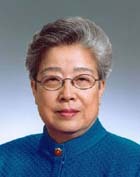- Wu Yi
* For the city, see
Yiwu
* For the mountains, seeWuyi Mountains Infobox_President
name = Wu Yi
吴仪

imagesize = 180px
caption =
order = Vice Premier of thePeople's Republic of China
term_start = March 2003
term_end = March 2007
order1 = Acting Executive Vice Premier of thePeople's Republic of China
term_start1 = March 2007
term_end1 = 2008
predecessor1 =Huang Ju
successor1 =Li Keqiang
birth_date = November1938
birth_place =Wuhan ,Hubei
death_date =
death_place =
premier =Wen Jiabao
premier1 =Wen Jiabao
party =Communist Party of China
spouse =
religion =
alma_mater =China University of Petroleum |Wu Yi (zh-tsp|s=吴仪|t=吳儀|p=Wú Yí; born November
1938 inWuhan ,China ) was one of four Vice Premiers of the State Council of thePeople's Republic of China , overseeing the country's economy until March 2008. Known as the "iron lady", Wu is one of the toughest negotiators in China's government, "Forbes " magazine considered her the second most powerful woman in the world in 2004, 2005 and 2007.cite web|url=http://www.forbes.com/lists/2007/11/biz-07women_The-100-Most-Powerful-Women_Rank.html|title=The 100 Most Powerful Women|publisher=Forbes.com|date=2007-08-30|accessdate=2008-01-28]Biography
In April 1962, she joined the
Communist Party of China . In August of the same year, she graduated from the Petroleum Refinery department at theBeijing Petroleum Institute , with a degree inpetroleum engineering. She spent much of her career as a petroleum technician, eventually becoming deputy manager at the Beijing Dongfang Hong refinery, and assistant manager and party secretary at the Beijing Yanshan Petrochemical Corporation.She was elected deputy mayor of
Beijing in 1988, and held that office until 1991. Following theTiananmen Square protests of 1989 , she persuaded coal workers threatening to go on strike to continue working after some of their colleagues had been killed. From 1991 until 1998, she held successively the posts ofDeputy Minister of Foreign Economic Relations and Trade ,Minister of International Trade and Economic Cooperation , and member of the Fourteenth and Fifteenth Central Committee of the Communist Party of China. A protege ofZhu Rongji , she became a state councillor in 1998, and was appointed Vice Premier of the State Council in March 2003. She was the first woman to hold the position since economic and political reforms in 1978, and the most powerful woman in Chinese politics sinceJiang Qing . She helped negotiate the PRC's entry into theWorld Trade Organization and reorganised the customs service after U.S. complaints over the widespread violation ofintellectual property rights.During the SARS crisis, she replaced
Zhang Wenkang , who had been fired for his coverup of the crisis, as health minister and headed a committee to solve the crisis. She was called the "Goddess of Transparency" by Time magazine for her leadership during the SARS crisis and named one of Time's 100 Most Influential People of 2004. In the middle of the SARS endemic, Wu fiercely snubbed the advocation forRepublic of China 's WHO participation during the WHO general assembly. One video clip aired widely inTaiwan showed Wu rebuffing the question of Taiwan's representation during interview by a Taiwanese reporter.Called by Chinese media as the "Iron Lady of China", Wu is regarded as a firm and direct woman who, unlike her colleagues, has not dyed her graying hair black. Since becoming Vice Premier, Wu has been an able diplomat in signing agreements with neighboring Asian countries. She also makes frequent inspection visits to many southern Chinese regions. Since the death of
Huang Ju , the senior Vice Premier, Wu has taken on the portfolio of overseeing financial work.Vice Premier Wu announced at the end of 2007 that she would retire in March 2008. During the last few months of her tenure she was involved in negotiations with U.S. toy giant
Mattel over toy lead content that brought significant woes to the reputation of Chinese products. At a meeting held with Chinese business leaders in early 2008 Wu revealed that her personal salary totaled RMB 120,000 per year, and told the business leaders that they should only "take money from the right places".Personal
Wu Yi never married. She personally attributes this to her over-rationalized belief of romance when she was reading Russian novels as a young woman. During the 1980's Wu was suspected to have a relationship with then-President
Yang Shangkun . She denied these allegations.References
External links
* [http://www.chinavitae.com/biography_display.php?id=33 Wu Yi biography at China Vitae]
Wikimedia Foundation. 2010.
